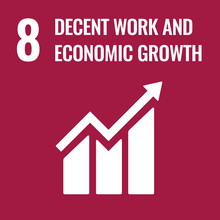
Goal 8: Promote inclusive and sustainable economic growth, employment and decent work for all
Sustained and inclusive economic growth can drive progress, create decent jobs for all and improve living standards. The pandemic is expected to have a devastating impact on global unemployment. More than one in six young people have stopped working since the onset of the COVID- 19 pandemic while those who remain employed have seen their working hours cut by 23 percent.
Infographic and Overview Why It Matters Things To Do The Twelve Targets
Sustainable Development Goal #8 explores the importance of continuous and inclusive economic growth to support society. At the University of Minnesota, we are committed to providing youth the best opportunity to transition to a decent job, providing youth with skills that match labour market demands, and leveling the playing field so that all aspiring youth can attain productive employment regardless of their gender, income level or socio-economic background.
RESEARCH AND EXPERTISE
OUTREACH AND PUBLIC ENGAGEMENT
Collaboration with Local Communities to Improve Work and Economic Outcomes
The Upper Midwest Agricultural Health and Safety Center (UMASH) is focused on improving the health and safety of agricultural workers, owner-operators, and communities in the Upper Midwest. UMASH efforts, in collaboration with five leading research and health care institutions, include extensive work related to improving farm safety and farmer mental health.
Extension's Connecting Businesses and Community Program maximizes Extension support, community organization, and applied research to support local business communities across the state. Their 3-step process typically takes one to two years to complete.
With grant funding from the U.S. Economic Development Administration (EDA), the University of Minnesota EDA Center studies economic development concerns in Minnesota. Since 2008, the EDA Center has been a partnership between University of Minnesota Extension and University of Minnesota Crookston with a focus on advancing high-growth entrepreneurship, promoting business expansion, and developing a highly-skilled regional workforce.
Through top-level scholarship and mapping, the Institute on Metropolitan Opportunity’s investigates the ways that laws, policies and practices affect development patterns in metropolitan areas, then provides practical resources and recommendations for reform for policymakers, planning officials and community organizations.
Collaboration with Government to Improve Economic Growth
Minnesota Economics Big Data Institute (MEBDI) is a research institute at the University of Minnesota that focuses on applied social science research, which harnesses the power of big data under the guidance provided by economic principles. MEBDI research initiatives lead to the production and dissemination of high-quality, detailed, microeconomic statistics relevant for researchers, policy makers, and the general public.
GREATER MSP is a partnership of more than 4500 individuals from more than 300 leading businesses, universities, cities, counties, and philanthropic organizations working together to accelerate the competitiveness and inclusive growth of our 15-county regional economy. UMN leadership has been involved with GREATER MSP efforts at every level — from board participation, to program development and management, to partnering on grants.
In 2021, UMN Extension experts were among several partners engaged with Governor Walz’s Council on Economic Expansion. The Council released Minnesota’s Moment: Roadmap for Equitable Economic Expansion in 2022.
Collaborative Projects with Local Industry to Improve Economic Growth
The Consortium for Workforce Research in Public Health (CWORPH) is a public health workforce research consortium consisting of six universities. CWORPH’s advisory structure includes engagement and collaborative partnerships with 10 national practice-oriented partners, including organizations with members in health departments and public health associations across the United States.
The Connecting Businesses and Community Program (CBC) is an essential element of local economic development efforts. The CBC strategy focuses on the retention and expansion of existing businesses to assist them in navigating today’s global economy.
OVPR’s Corporate Engagement Center (CEC) helps to connect businesses with University minds and research initiatives. They can help facilitate navigation through the UMN, develop the right connections, identify areas of strategic alignment, and match researchers with organizations. By design, CEC also offers a holistic experience for companies who may also be interested in hiring University graduates, improve their employees’ professional development, and uncover sponsorship opportunities.
Public Events Related to Decent Work and Economic Growth
On Equal Pay Day 2023, the Center on Women, Gender and Public Policy released a new fact sheet, Who Earns?, about the state of of women’s employment and the gender wage gap in Minnesota. They also hosted a moderated discussion featuring the fact sheet authors.
The Heller-Hurwicz Economics Institute brings together economic experts from the University of Minnesota and beyond to highlight key policy insights that can be drawn from economic analysis. These gatherings draw individuals from the academic, policy, media and business communities to spark dialogue across sectors.
UMN Extension's Farm Transition and Estate Planning Program develops an annual series of workshops, webinars, retreats, and written materials aimed at farm families and landowners in business or asset succession.
As part of their economic development programming, UMN Extension offers a variety of education and training options for community leaders and individuals.
The Heller-Hurwicz Economics Institute co-sponsors a Minnesota seminar and visitor series launched in 2014 by Professor Ellen McGrattan. The series covers a wide range of topics and provides graduate students with a unique opportunity to collaborate with leaders in the field.
MEBDI organizes a Fall Conference on Big Data and Models annually as part of the MEBDI Fall Big Data Week, and a second annual Conference in Spring/Summer.
